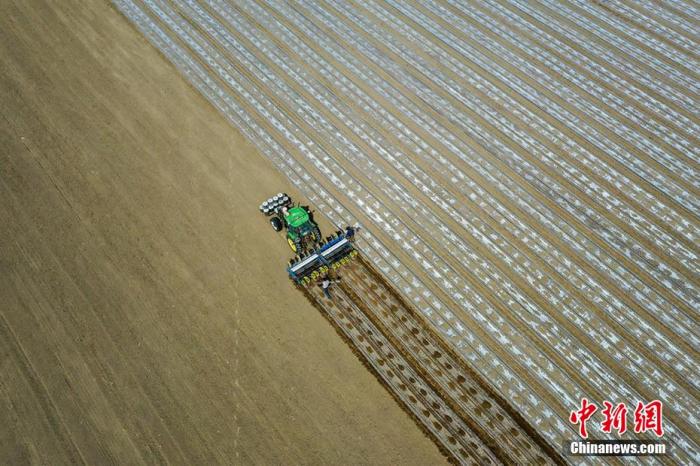China News Service, Guangzhou, December 26 (Reporter Li Xuefeng) The Institute of Communication and Frontier Governance of Jinan University and the School of Journalism and Communication of Jinan University jointly released an independent research report in Guangzhou on the 26th. The impact of sanctions on the global cotton industry chain.
Data map: In the cotton fields in Kudelik Village, Bostenhu Township, Bohu County, Bazhou Prefecture, Xinjiang, cotton farmers use the new Beidou satellite navigation technology to plant cotton at full capacity.
Photo by Nian Lei
According to reports, the research team conducted surveys in 17 counties and cities in Aksu, Kashgar, and Guangdong Province for more than 3 months. The survey subjects were more than 70 people, including different types of cotton growers in various regions, different sizes and types of cotton. The person in charge of a textile and clothing company.
On this basis, the research report was completed.
The report believes that China's cotton industry has become the central link of the global cotton industry chain by virtue of high-quality cotton raw materials and a complete supply chain network.
Therefore, destroying China's cotton industry is tantamount to destroying the global cotton industry chain.
A large number of facts have proved that the U.S. Xinjiang cotton sanctions have dealt a blow to all links in the global cotton industry chain, including raw material production, cotton yarn processing, weaving and dyeing, fabric production, clothing production, and terminal sales.
The report pointed out that the U.S. Xinjiang-related sanctions did not have a significant impact on China's domestic cotton spinning manufacturing links.
First of all, under the escort of the government, enterprises, and agricultural cooperatives, cotton growers in Xinjiang do not worry about the risk of US sanctions and still hope to continue to expand production.
Secondly, China's relevant policies and market futures trading mechanisms provide guarantees for the supply of cotton raw materials, and thanks to the strong resilience and pressure resistance of the domestic market, the domestic cotton spinning processing and manufacturing links are functioning well.
The report also pointed out that in the capitalist global economic system headed by the United States, Chinese cotton textile and apparel companies are actually being "forced labor" by the Western capitalist globalization system, and China is the one being exploited.
Therefore, the US sanctions on Xinjiang cotton are "false justice."
The sanctions not only harm the interests of all countries in the global cotton industry chain, but also under the chain reaction of the sanctions, American companies and people bear high economic costs for this, such as paying high tariffs and skyrocketing prices.
In March of this year, Jinan University issued a research report on "Investigation of Xinjiang Workers' Work in the Mainland".
The reissue of the research report after a lapse of 9 months aims to reveal with facts that the US sanctions based on geopolitical interests have destroyed the global industrial chain. An excuse for hegemony.
It is reported that the Institute of Communication and Frontier Governance of Jinan University will carry out oral history research on the victims and witnesses of China's violent terrorism in the next step.
(Finish)

